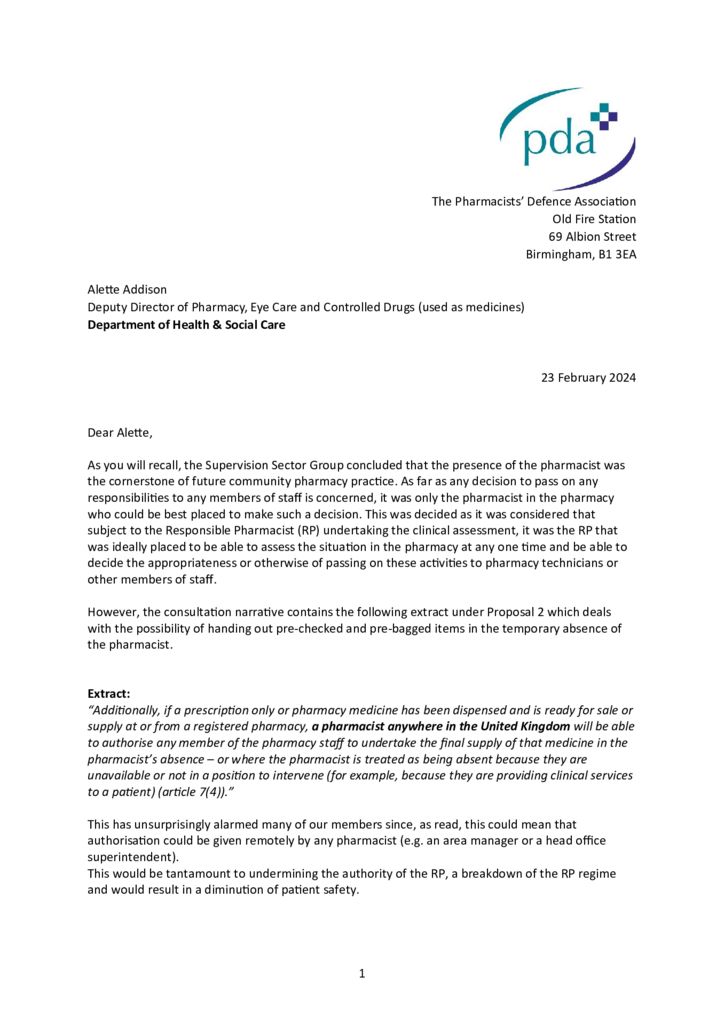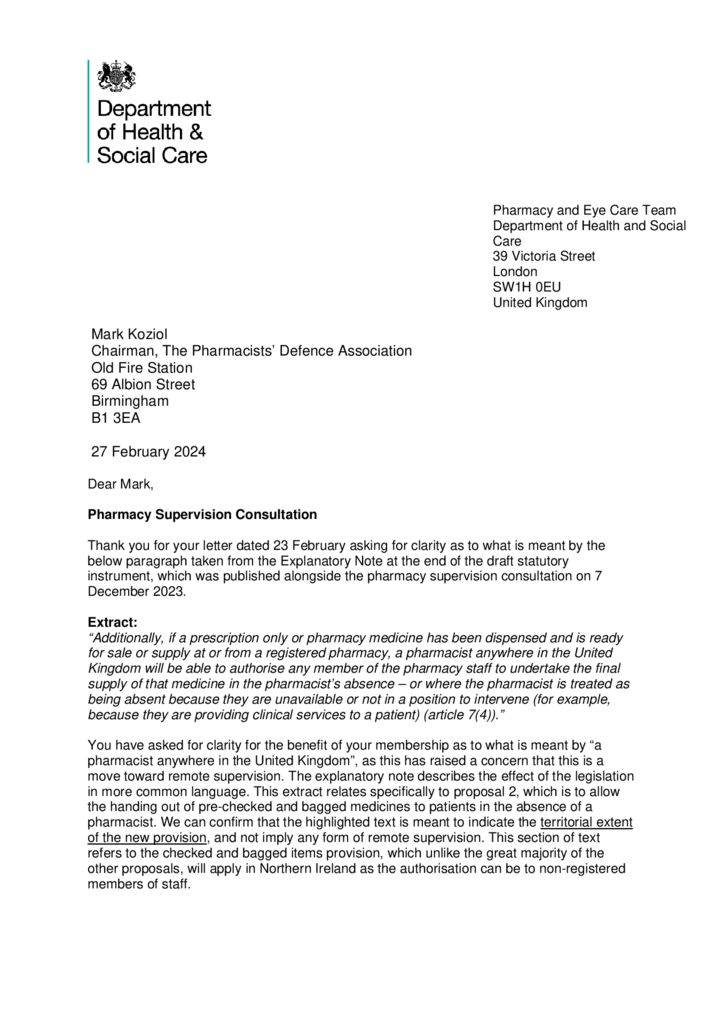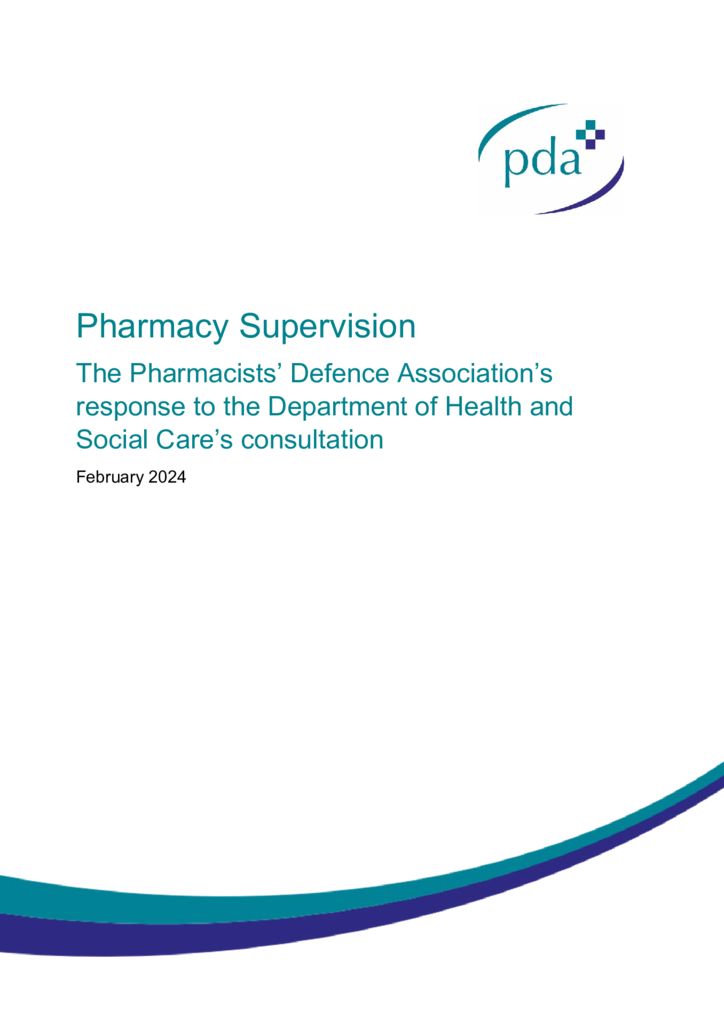After many years of debate around the governance framework for pharmacy supervision, the DHSC launched a consultation which concluded on 29 February 2024. This consultation is the most significant for pharmacy practice in decades and the PDA was able to submit a comprehensive analysis and response. PDA members are encouraged to read the full PDA submission here
Taking the knowledge from the many employed and locum pharmacists that make up the membership of the PDA, a significant casework pool, feedback from dedicated member events going back nearly twenty years, and extensive scrutiny with the support of legal counsel, the PDA has provided its views on the proposals. Accompanying these views are the additional caveats as to what the PDA subsequently expects from the General Pharmaceutical Council (GPhC) and Pharmaceutical Society of Northern Ireland (PSNI) in the development of underpinning rules and regulations for Responsible Pharmacists (RP) and Superintendent Pharmacists which will follow the DHSC’s consultation.
Because of the large number of caveats, the PDA could neither agree nor disagree with many of the proposals, but should these caveats be accepted by the government, the result would be a welcome development. This is particularly the case when set against the DHSC proposals of 2006 for remote supervision (the operation of a community pharmacy in the absence of a pharmacist), a cause of anxiety that pharmacists have lived with for nearly twenty years.
Pre-consultation
In 2022, after the government’s Rebalancing Medicines Legislation and Pharmacy Regulation Programme Board was formally declared as defunct, the PDA joined a cross sector Pharmacy Supervision Practice Group to try and find a way forward for supervision. A change of senior personnel at the NHS and DHSC has enabled a new direction to be taken and unlike the Rebalancing Board, the supervision practice group was not led by the government nor by a former Chief Pharmacist. Instead, the group involved organisations with different perspectives from across the whole community pharmacy sector. The group made several recommendations in August 2023, which are the foundations of the PDA’s response and which were also used as the baseline for the DHSC consultation which was published in December 2023.
The DHSC consultation
The PDA welcomed the position of the four NHS Chief Pharmaceutical Officers from the UK nations as set out in the consultation foreword. They said that the proposals were not about remote supervision but instead were intended to make the pharmacists more accessible to the public in a community pharmacy and not less. The PDA’s position has always been that the physical presence of a pharmacist represents the bedrock of community pharmacy.
The PDA also sees the benefits of what the DHSC is proposing; the concept of ‘authorisation’, which would transfer accountability for assembly and preparation from the pharmacist to a pharmacy technician, meaning the pharmacist would no longer be accountable for any dispensing error when a pharmacy technician has been properly authorised to undertake those activities. At all times, the RP would still be responsible for the clinical assessment, an activity in which the unique skills of a pharmacist are solely relied upon. These proposals are the very essence of skill mix. The PDA calls for a definition in legislation of what ‘authorisation’ means and has also stipulated several other necessary conditions for this proposal to be safe and effective.
Aseptic facilities
Whilst the proposals above on community pharmacy supervision are based on skill mix, the PDA does not support the DHSC proposals in relation to pharmacy technicians being able to supervise hospital aseptic facilities, as this would in effect be role substitution. PDA members practicing in hospitals expressed concerns that the loss of the clinical expertise of a pharmacist in the supervision of aseptic facilities, as proposed, would have a detrimental impact on the service and would lead to a diminution of patient safety.
PDA sought clarification on the term ‘any pharmacist in the UK’
A significant area of concern from the explanatory notes that accompanied the draft Statutory Instrument in the consultation was the suggestion that ‘any pharmacist in the UK’ would be able to make an authorisation in certain situations. As worded, this introduced the risk of remote supervision, with the possibility of a pharmacist working anywhere, e.g. in a head office, or an area manager overseeing many pharmacies, making a blanket authorisation that would over-ride the authority of the Responsible Pharmacist.
The PDA could not let the consultation conclude with this ambiguity in place and after taking legal advice, secured written clarification directly from the Department. Government Officials confirmed that the intention of the wording was to ensure that the Statutory Instrument would apply in all geographical areas of the UK, rather than to enable any kind of remote supervision from anywhere in the UK. The Department have confirmed they will clarify this in their drafting of the legislation before it is put to Parliament.
Read the PDA’s letter here
Read the government’s response here
Supporting the delivery of pharmaceutical care
Mark Koziol, PDA Chairman said, “Ever since the government proposed the idea of remote supervision (the plan to operate a pharmacy in the absence of a pharmacist) in 2006, the supervision debate has been an issue that has led to significant anxiety and suspicion amongst pharmacists.
For nearly two decades, the PDA has (often single handidly) stood up for patient safety considerations and the simple logic that a pharmacy must have a pharmacist physically present to be safe for the public. With the passage of time, and with the benefit of discussion at the supervision group, virtually all the organisations in pharmacy have also agreed that position.
After the previous Chief Pharmacists’ Rebalancing Board was finally put out of commission and from the moment we began to participate in the sector group on supervision, we played a very active role on behalf of our members in the discussions that led to this agreement.
I sat next to Elizabeth Lee at the Royal Court of Appeal when the PDA’s legal team successfully quashed her suspended prison sentence for a dispensing error. I learned first-hand what can happen when a pharmacist is required to take responsibility for the dispensing error of others. Through the work of the PDA, I am also familiar with the enormous workload involving pharmacists in the preparation and assembly of many hundreds of prescriptions each day.
If the changes to supervision that are being proposed are introduced properly, with the right governance framework, including retaining the existing RP regime, we could instead see pharmacists with the time and capacity to focus on the delivery of pharmaceutical care and pharmacy technicians able to take responsibility for their work around the accurate assembly and preparation of prescribed medicines. This has been a fundamental part of PDA policy on practice and patient safety for many years.
It is important to note that the subject of this consultation is only around the legislation, the next stage will be around the regulatory rules, regulations and professional practice guidance. All parts will need to be aligned to ensure patient safety and to allow pharmacists to exercise fully the potential of their professional contribution. The PDA will continue to ensure that the changes support pharmacists in their practice.”
Read the PDA full consultation response here
Learn more
- PDA representing interests of employed and locum pharmacists in supervision working group
- PDA shares its position on the DHSC consultation on supervision and encourages members to have their say
- PDA Chairman, Mark Koziol presenting to the 2020 Sigma conference about supervision
- Why Covid-19 has shown that remote supervision can never be supported
- It’s time to kill off the remote supervision concept
- Government respond to anti remote supervision petition to keep pharmacists present for patients
- PDA fights to stop the threat of remote supervision
- PDA response to leaked DoH document on supervision of medicines supply by pharmacy technicians
- Profession must re-take the initiative on updating supervision rules
- Stopping Remote Supervision – what next?
- Vote for these candidates to deal a blow to Remote Supervision
- Which? Report Slates Remote Supervision
Not yet a PDA member?
If you have not yet joined the PDA, we encourage you to join today and ask your colleagues to do the same.
Membership is FREE to pharmacy students, trainee pharmacists and for the first three months of being newly qualified.
Read about our key member benefits here.


